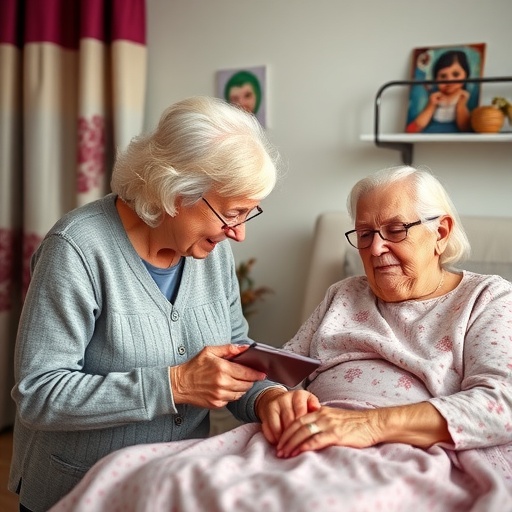In an illuminating study that magnifies the complex interplay between emotional and physical health among the aging population, researchers have unveiled the significant mediating role of sarcopenia in the connection between loneliness and frailty in nursing home residents. The research, conducted by a team led by Chen, Z., and including Zheng, D. and Wu, S., provides a comprehensive examination of how emotional states such as loneliness can catalyze physical health issues, particularly in vulnerable individuals residing in assisted living facilities. This burgeoning field of study not only shines a light on the dire consequences of emotional isolation but also underscores the necessity for holistic approaches to elderly care.
At its core, the term ‘sarcopenia’ refers to the progressive loss of skeletal muscle mass and strength associated with aging. Widely recognized as a critical facet of frailty, sarcopenia has implications that extend far beyond mere muscle loss. Individuals who experience sarcopenia often face decreased mobility, increased risk of falls, and a higher likelihood of chronic health conditions, all of which compound the challenges of aging. As nursing home residents frequently find themselves in physical and emotional decline, understanding the linkages among these aspects becomes paramount.
The study adopted a cross-sectional design, meticulously capturing the nuances of life within nursing homes. By focusing on a cohort of residents, the researchers explored the psychosocial environment in which these individuals live. Loneliness emerged as a powerful determinant, with profound effects on physical health parameters, particularly muscle strength and overall functional status. This correlation suggests an urgent need to address emotional well-being as part of comprehensive healthcare strategies for the elderly.
Previous research has often examined loneliness in isolation; however, this study positions it as a precursor to more severe health outcomes, namely frailty and diminished muscle mass. The findings present a compelling case for the integration of psychological support and physical health interventions within nursing homes. The team’s analysis reveals that residents experiencing heightened levels of loneliness tend to exhibit greater signs of sarcopenia, leading to an overall frailer state and diminished quality of life.
Diving deeper into the data, researchers noted demographic and psychosocial factors that could exacerbate the loneliness-frailty-sarcopenia nexus. For instance, isolation during the COVID-19 pandemic has amplified feelings of loneliness among the elderly, thus necessitating urgent intervention efforts. Factors like limited social networks, loss of loved ones, and physical disabilities further contribute to this emotional plight, showcasing the multifaceted nature of loneliness.
The implications of these findings are particularly salient for healthcare policymakers and practitioners. Traditional approaches to elder care have often emphasized physical health alone; however, this study indicates an urgent need for a paradigm shift. Healthcare systems should incorporate mental health assessments and interventions to foster social connections among residents. Activities that encourage interaction, community engagement, and relationship-building could mitigate loneliness and, by extension, its destructive impact on physical health.
Innovative programs focusing on intergenerational relationships and community-service-driven activities could be invaluable. Collaborative efforts with local organizations, schools, or youth programs can bridge the gap between generations, creating a network of social support that can alleviate loneliness. Such initiatives promote not only emotional well-being but also boost opportunities for physical activity among nursing home residents, further countering sarcopenia.
Moreover, the study raises questions about the role of physical activity in combatting both loneliness and sarcopenia. Regular exercise regimens tailored to residents can help maintain strength and muscle mass, while also serving as enjoyable social activities. Group exercises, dance classes, or simple walking clubs could foster camaraderie, nurture friendships, and, in turn, address the isolating effects that contribute to frailty.
Equally, mental health support services should be integrated into standard nursing home protocols. Trained counselors or therapists can provide invaluable resources for residents grappling with feelings of isolation. By facilitating discussions about grief, loss, and connection, these professionals can empower residents to forge meaningful relationships with one another, diminishing feelings of loneliness and subsequently reducing the risk of sarcopenia.
As the global population ages, the urgency of addressing the factors contributing to loneliness and frailty among seniors cannot be overstated. The insights garnered from this study serve as a clarion call to both caregivers and policymakers alike, emphasizing the necessity of viewing elder care through a multifactorial lens. By addressing the intertwined aspects of loneliness, frailty, and sarcopenia, we are invited to rethink how we approach aging.
In conclusion, this groundbreaking research conducted by Chen and colleagues unveils a critical link that has far-reaching implications for the elderly care paradigm. Acknowledging the intricate relationship between emotional and physical wellbeing represents a significant step toward enhancing the quality of life for nursing home residents. Creating supportive environments that prioritize both mental and physical health can alter the trajectory of aging, leading to healthier, happier futures for our aging population.
Modern elder care must evolve to accommodate these findings. The incorporation of comprehensive mental health strategies, inclusive community connections, and integrated physical health programs offers a way forward in addressing the multifaceted challenges faced by aging individuals. By fostering environments that cultivate social interaction, empathy, and support, we can work toward minimizing the devastating effects of loneliness and frailty as residents navigate their golden years.
Subject of Research: The mediating role of sarcopenia in the link between loneliness and frailty among nursing home residents.
Article Title: The mediating role of sarcopenia in the link between loneliness and frailty among nursing home residents: a cross-sectional study.
Article References:
Chen, Z., Zheng, D., Wu, S. et al. The mediating role of sarcopenia in the link between loneliness and frailty among nursing home residents: a cross-sectional study.
BMC Geriatr 25, 722 (2025). https://doi.org/10.1186/s12877-025-06342-5
Image Credits: AI Generated
DOI: 10.1186/s12877-025-06342-5
Keywords: sarcopenia, loneliness, frailty, nursing home residents, elderly care, mental health, physical health, aging, social connection.
Tags: assisted living facilities challengeschronic health conditions in seniorsemotional isolation consequencesemotional states and physical declinefrailty and aginggeriatric health and well-beingholistic elderly care approachesinterdisciplinary research on agingloneliness in nursing home residentsmuscle loss and mobilityphysical health issues in elderlysarcopenia and emotional health





